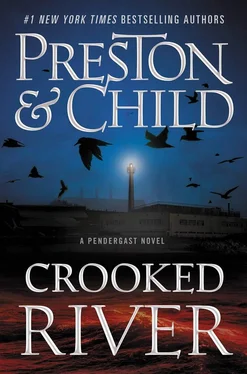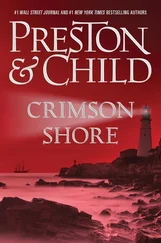Now Coldmoon understood: he was still expected to play chauffeur, but Pendergast had sweetened the deal by providing almost three tons of rolling opulence. He shrugged, then twisted the large round knob that put the vehicle in gear.
“I’d like to introduce you to the oceanographer I’ve privately engaged to work on the case,” said Pendergast. “She’s trying to backtrack the feet to where they entered the ocean — without much success yet, unfortunately.”
“Sure, I’d love to meet her.”
“But before that, why don’t we drop off your luggage at the lodgings I’ve rented for the duration? My ward, Constance Greene, will be staying with us, but I think you’ll find the house both commodious and private.”
“Uh, sure.” Ward ? That sounded a little odd, but then, nothing about Pendergast was normal.
Pendergast gave him the address and — after some fiddling with the touch screen on the central panel of the dashboard — he managed to punch it into the GPS.
“A/C?” Coldmoon asked.
“No, thank you.” Pendergast rolled down his window and Coldmoon did the same. As they drove out of Fort Myers, taking SR 867 south, Coldmoon observed with curiosity the neighborhoods they were passing through. They were a mixture typical to Florida: some wealthy, some shabby, many in between — but all high density. It was amazing how many damn people there were in this state. In South Dakota there were stretches of highway where you could drive a hundred miles without seeing a house.
And then, quite suddenly, they passed by a checkpoint and emerged onto a causeway that curved like a scimitar over a shallow bay, the sun glittering off the water, with the low outline of Sanibel Island growing on the horizon. Considering its size and weight, the Range Rover was surprisingly responsive, and it accelerated effortlessly, sending a warm breeze coursing through the interior. For a moment, however brief, Coldmoon could understand why someone might want to live in Florida.
Once on the island, the houses moved upscale, and the farther he drove, the wealthier it got. Toward the north end of the island they came to a line of stopped cars.
“I’m afraid there’s another checkpoint up ahead,” said Pendergast.
But the traffic went quickly, and soon they had flashed their badges and were through. A short bridge led them across an inlet to Captiva Island. The beach and parking lot to their left had been turned into a staging ground, it seemed, with tents, trailers, container offices, and a van with satellite dishes on top. Two Coast Guard patrol boats plied the ocean beyond the line of breaking surf.
“That was where most of the feet washed up,” said Pendergast as Coldmoon slowed to look. “The entire beach has been taped off as a crime scene, to the great annoyance of the inhabitants.”
“I’d be annoyed, too. That’s a beautiful beach.”
They drove on, leaving the staging ground behind. Past the far end of the beach, Coldmoon spied a huge Victorian house, taller than the others, rising above the palms and buttonwoods, with two towers and a widow’s walk, casting a long shadow across the beach. He knew right away this must be where Pendergast was staying — the house, with its faded elegance, fit his personality perfectly.
“The Mortlach House?”
“Indeed. Pull into the porte cochere, if you please, and stop by the door.”
Coldmoon wasn’t sure what a porte cochere was, but he turned into the driveway that ran alongside the house, looping through a sheltered overhang. He brought the SUV to a stop before a set of tall double doors with oval windows.
“Wow,” said Coldmoon, stepping out and looking up, “this place looks haunted.”
“Indeed,” murmured Pendergast.
The doors opened and Coldmoon stopped in his tracks. A woman appeared on the landing, wearing a long dress, her dark hair bobbed, her violet eyes directed on him.
“You must be Agent Coldmoon,” she said in a contralto voice, coming forward. She paused to look him up and down. “From Aloysius’s description, I was expecting someone a little more... informal.”
Coldmoon grinned. “Don’t worry, I’m as slovenly as they come. This is just a disguise to fool my betters.”
That produced a faint smile. There was something absolutely intriguing about this young woman, who seemed self-assured far beyond her years and spoke with an unusual inflection that reminded him of old films.
“Don’t you have a valise?” she asked.
Coldmoon realized he’d been standing there dumb. “Right. In the back.” He went around the car, opened the tailgate, and pulled out his bag.
“I’ll show you to your room,” said Constance, turning and heading back inside. Coldmoon followed.
“I’m retiring to my quarters,” Pendergast said from behind them. “You’re in good hands with Ms. Greene.” He slipped away.
Entering the cool dimness of the house was like stepping back in time. The interior smelled of furniture polish, fabric, and old wood. He could see, past the entryway and down a hall, a large sitting room with Persian rugs and antique furniture. A row of windows looked out across a veranda to the sea horizon, where he could hear the distant rhythm of surf and the crying of gulls.
Constance turned and mounted a set of stairs to the right of the entryway. “This way, Agent Coldmoon.”
Coldmoon followed, up to an annex that served as a small sitting room, with three rooms going off it — two bedrooms and a bath.
“The servants’ quarters,” said Constance. “Separate from the rest of the house.”
“Servants’ quarters,” Coldmoon repeated in a tone of irony.
Constance again fixed those violet eyes on him. “You are Agent Pendergast’s junior partner, are you not, Mr. Coldmoon?”
Coldmoon couldn’t help but laugh at this brazen comment, so archly delivered. “I guess I am a kind of servant.” He set down his bag. “By the way, you’re free to call me Armstrong if you wish.”
That slipped out before he even knew he’d said it. Why had he offered up this information? He almost never told people his first name.
“And you may call me Constance. Your bedroom is here. The other bedroom has a desk for you to use as a workspace.” A key appeared in a delicate white hand. “Your key, Armstrong.”
“Thank you, Constance.” He took it. “Um, is the house really supposed to be haunted?”
“So they say.”
“What’s the story?”
She gave him another arch smile. “That’s my investigation. Once I’ve pieced it together, we’ll light a fire in the parlor and I’ll regale you with the details.”
Peter Quarles made his way down the crooked, congested streets of a city that had no name. Or if it had a name, he had not been able to discover it. All he could say for certain was that he was in Guangdong Province in southern China. Dongguan, a first-tier manufacturing city, was to his east, across the Pearl River. Just to his west was Foshan, itself an agglomeration of three dozen towns that specialized in industries from chemical processing to communications equipment to biotechnology. And here he was, in a bustling no-man’s-land of small-time commerce and manufacturing, situated in an anonymous district just a stone’s throw from the South China Sea.
Yet Quarles felt curiously at home. He was not so many years removed from his time in import-export work, and was not so brainwashed by Bureau mentality, that he’d found it difficult to slip back into his old guise. After just one day, the crowds, the endless yammering, the smog, and the smells had all become familiar and comfortable, and he fell back into that shuffling two-step that one used to get about in the congestion. Nobody would suspect him of being anything more than a gweilo middleman, working at the low end of the manufacturing business — which, in fact, was true. Except that his Mandarin was perhaps a little too refined.
Читать дальше










![Линкольн Чайлд - Стихи для мертвецов [litres]](/books/396536/linkoln-chajld-stihi-dlya-mertvecov-litres-thumb.webp)

